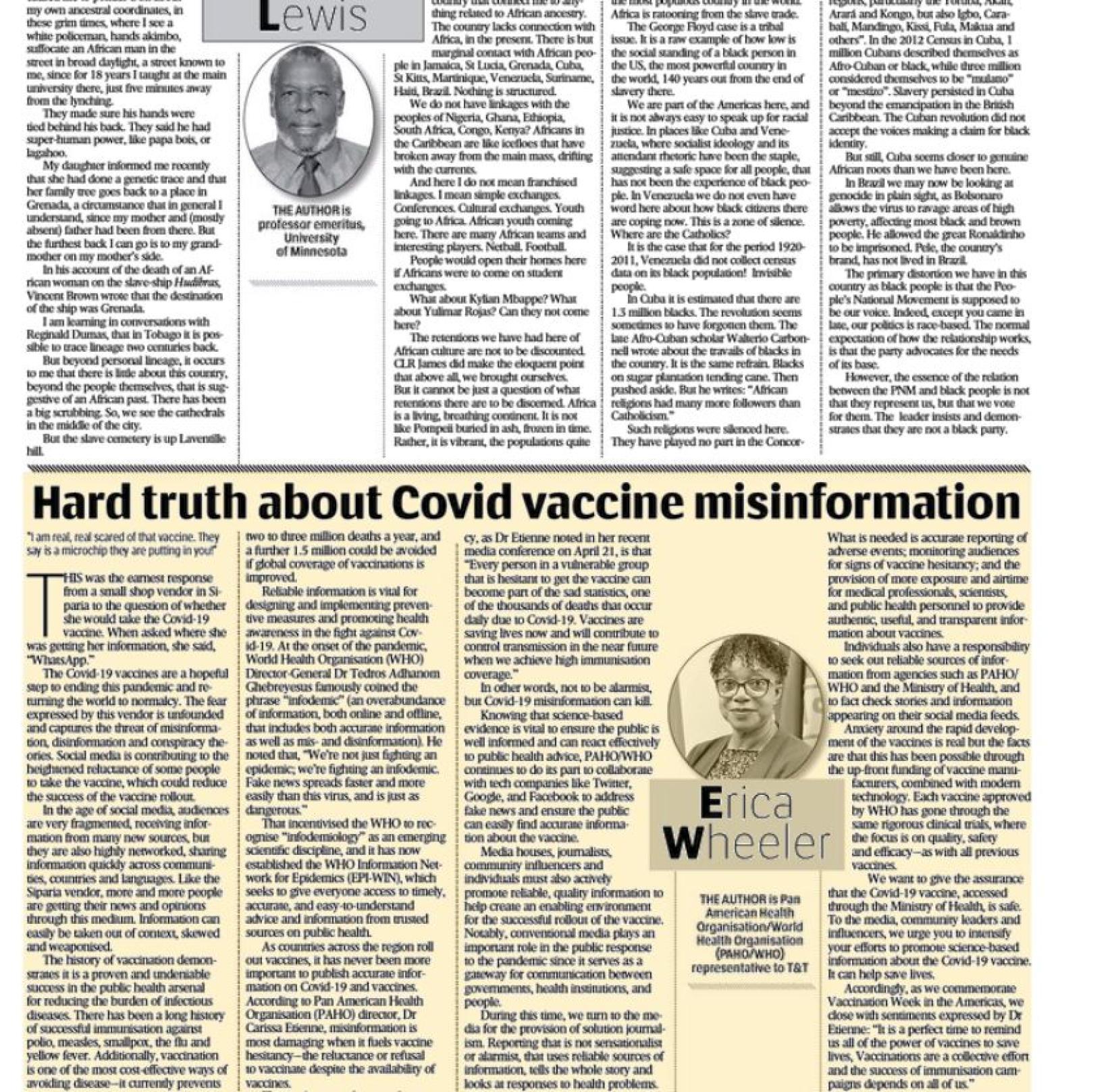Hard Truth About COVID Vaccine Misinformation

“I am real, real scared of that vaccine. They say is a microchip they are putting in you!”
THIS was the earnest response from a small shop vendor in Siparia to the question of whether she would take the Covid-19 vaccine. When asked where she was getting her information, she said, “WhatsApp.”
The Covid-19 vaccines are a hopeful step to ending this pandemic and returning the world to normalcy. The fear expressed by this vendor is unfounded and captures the threat of misinformation, disinformation and conspiracy theories. Social media is contributing to the heightened reluctance of some people to take the vaccine, which could reduce the success of the vaccine rollout.
In the age of social media, audiences are very fragmented, receiving information from many new sources, but they are also highly networked, sharing information quickly across communities, countries and languages. Like the Siparia vendor, more and more people are getting their news and opinions through this medium. Information can easily be taken out of context, skewed and weaponised.
The history of vaccination demonstrates it is a proven and undeniable success in the public health arsenal for reducing the burden of infectious diseases. There has been a long history of successful immunisation against polio, measles, smallpox, the flu and yellow fever. Additionally, vaccination is one of the most cost-effective ways of avoiding disease—it currently prevents two to three million deaths a year, and a further 1.5 million could be avoided if global coverage of vaccinations is improved.
Reliable information is vital for designing and implementing preventive measures and promoting health awareness in the fight against Covid-19. At the onset of the pandemic, World Health Organisation (WHO) Director-General Dr Tedros Adhanom Ghebreyesus famously coined the phrase “infodemic” (an overabundance of information, both online and offline, that includes both accurate information as well as mis- and disinformation). He noted that, “We’re not just fighting an epidemic; we’re fighting an infodemic. Fake news spreads faster and more easily than this virus, and is just as dangerous.”
That incentivised the WHO to recognise “infodemiology” as an emerging scientific discipline, and it has now established the WHO Information Network for Epidemics (EPI-WIN), which seeks to give everyone access to timely, accurate, and easy-to-understand advice and information from trusted sources on public health.
As countries across the region roll out vaccines, it has never been more important to publish accurate information on Covid-19 and vaccines. According to Pan American Health Organisation (PAHO) director, Dr Carissa Etienne, misinformation is most damaging when it fuels vaccine hesitancy—the reluctance or refusal to vaccinate despite the availability of vaccines.
The implication of vaccine hesitancy, as Dr Etienne noted in her recent media conference on April 21, is that “Every person in a vulnerable group that is hesitant to get the vaccine can become part of the sad statistics, one of the thousands of deaths that occur daily due to Covid-19. Vaccines are saving lives now and will contribute to control transmission in the near future when we achieve high immunisation coverage.”
In other words, not to be alarmist, but Covid-19 misinformation can kill.
Knowing that science-based evidence is vital to ensure the public is well informed and can react effectively to public health advice, PAHO/WHO continues to do its part to collaborate with tech companies like Twitter, Google, and Facebook to address fake news and ensure the public can easily find accurate information about the vaccine.
Media houses, journalists, community influencers and individuals must also actively promote reliable, quality information to help create an enabling environment for the successful rollout of the vaccine. Notably, conventional media plays an important role in the public response to the pandemic since it serves as a gateway for communication between governments, health institutions, and people.
During this time, we turn to the media for the provision of solution journalism. Reporting that is not sensationalist or alarmist, that uses reliable sources of information, tells the whole story and looks at responses to health problems. What is needed is accurate reporting of adverse events; monitoring audiences for signs of vaccine hesitancy; and the provision of more exposure and airtime for medical professionals, scientists, and public health personnel to provide authentic, useful, and transparent information about vaccines.
Individuals also have a responsibility to seek out reliable sources of information from agencies such as PAHO/WHO and the Ministry of Health, and to fact check stories and information appearing on their social media feeds.
Anxiety around the rapid development of the vaccines is real but the facts are that this has been possible through the up-front funding of vaccine manufacturers, combined with modern technology. Each vaccine approved by WHO has gone through the same rigorous clinical trials, where the focus is on quality, safety and efficacy—as with all previous vaccines.
We want to give the assurance that the Covid-19 vaccine, accessed through the Ministry of Health, is safe. To the media, community leaders and influencers, we urge you to intensify your efforts to promote science-based information about the Covid-19 vaccine. It can help save lives.
Accordingly, as we commemorate Vaccination Week in the Americas, we close with sentiments expressed by Dr Etienne: “It is a perfect time to remind us all of the power of vaccines to save lives, Vaccinations are a collective effort and the success of immunization campaigns depends on all of us.”
This op-ed was first published in the Trinidad Express on April 26, 2021:





